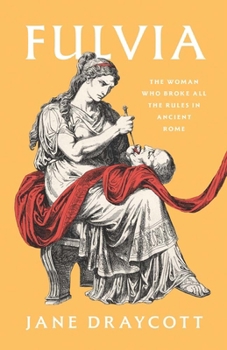Fulvia: The Woman Who Broke All the Rules in Ancient Rome
Jane Draycott reclaims the life story of Fulvia, one of the most powerful women of the late Roman Republic Fulvia was born into wealth, privilege, and prestige around the year 80 BCE, yet there was nothing inherently special about her--she was not a saint, an empress, or a queen. But during the years leading up to the fall of the Roman Republic, Fulvia was moving in the most powerful social circles, and by her death in 40 BCE she had amassed a degree of political and military power unprecedented for a woman. Fulvia's success came at considerable cost, however. None of her three marriages to politically powerful men--most famously to Marc Antony--lasted, and three of her five children died violently. She was repeatedly ridiculed before the Roman Senate and by wider society for daring to step outside the confines of the domestic sphere. The deliberate and systematic destruction of her reputation shaped her legacy--including Cicero's description of Fulvia as "a thoroughly rapacious woman"--for two millennia. Ample literary, documentary, and archaeological sources for Fulvia exist, yet most contemporary depictions of her were extremely negative. Historian Jane Draycott, reading between the lines of the ancient evidence, proposes a more nuanced interpretation. Using Fulvia as a guide, she invites readers to visit an unfamiliar Rome, one in which women played a crucial role during Rome's violent transition from a republic to the dictatorship of the Roman Empire.
Format:Hardcover
Language:English
ISBN:0300278047
ISBN13:9780300278040
Release Date:July 2025
Publisher:Yale University Press
Length:296 Pages
Customer Reviews
0 rating





